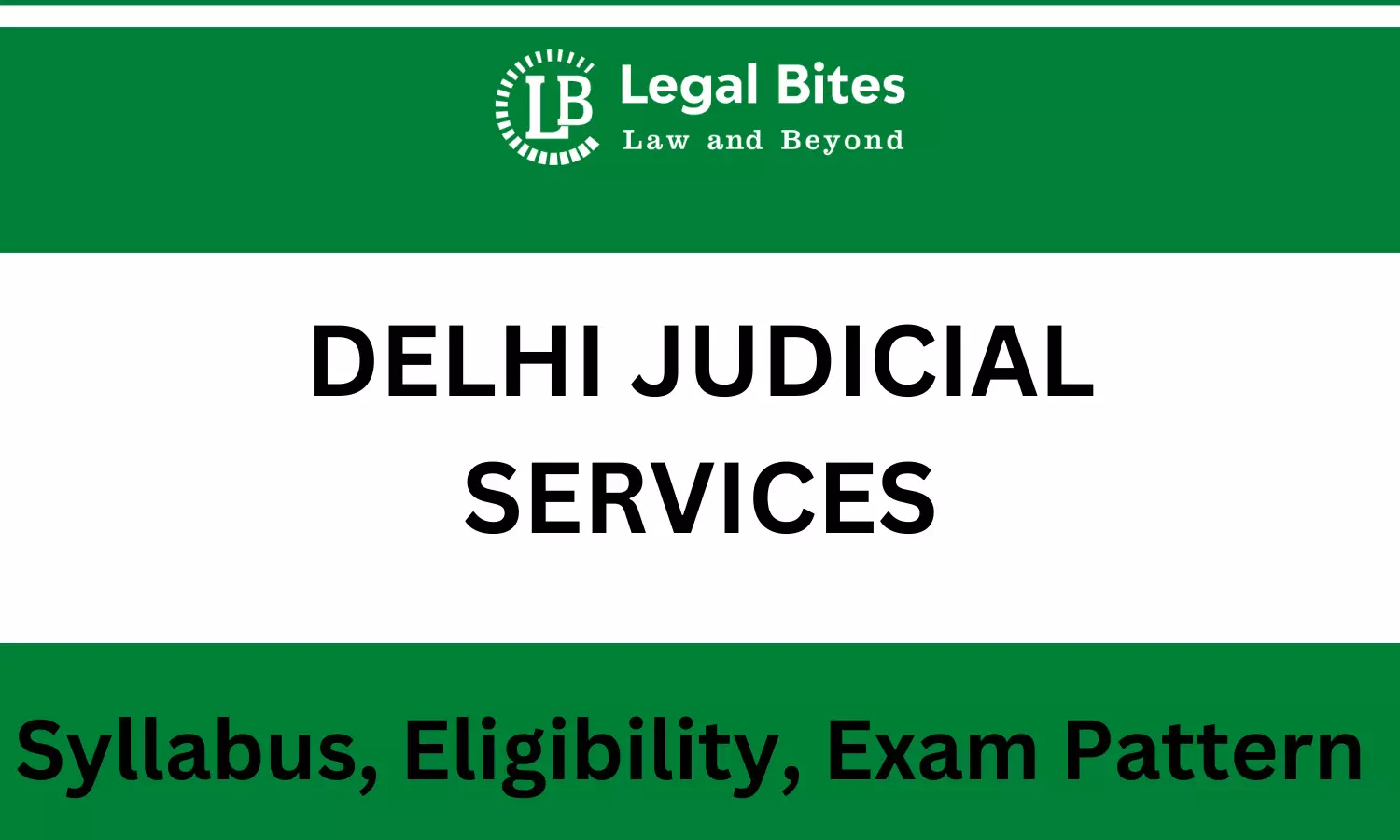Delhi Judicial Services Exam | Eligibility, Exam Pattern and Syllabus
Check here, for complete details of the Delhi Judicial Services Exam such as eligibility criteria, age limit, exam pattern, and syllabus.

Check here, for complete details of the Delhi Judicial Services Exam such as eligibility criteria, age limit, exam pattern, and syllabus.
Delhi Judicial Services Exam – Eligibility, Exam Pattern and Syllabus
The High Court of Delhi conducts the Delhi Judicial Service Exam annually to recruit Civil Judges. Delhi High Court invites online applications from eligible candidates for filling up vacancies in Delhi Judicial Service by holding Delhi Judicial Service Examination in three stages:
- Delhi Judicial Service Preliminary Examination, and
- Delhi Judicial Service Main Examination
- Candidates shortlisted in mains exam are called for viva voce. Candidates who qualify in the last phase get selected for the posts offered by the High Court of Delhi.
The Judiciary exam or the PCS (J)-Provincial Civil Service-Judicial Examination is the entry-level exam for law graduates to become appointed as members of the subordinate judiciary. The members are appointed by the state government under the supervision of the respective high court. The members are appointed based on the Judiciary exam.
Eligibility
According to Delhi Judicial Services Exam eligibility criteria, a candidate shall appear in the examination if he/she is:
- a citizen of India;
- a person practising as an Advocate in India or a person qualified to be admitted as an Advocate under the Advocates Act, of 1961.
- Must not be more than 32 years of age.
Note: In the case of candidates belonging to Scheduled Castes/Tribes, the upper age limit is relaxable by 5 years. General category disabled candidates would thus be eligible for age relaxation up to 10 years and SC/ST category disabled candidates would be eligible for age relaxation up to 15 years.
Reservation
Apart from the backlog vacancies, fresh recruitments follow reservations as per SC-15%, ST-7.5%, and OBC-27% provided.
Exam Pattern
Delhi Judicial Service Examination is held in two successive stages:-
- Delhi Judicial Service Preliminary Examination (Objective Type with 25% negative marking) for selection for the Main Examination, and
- Delhi Judicial Service Main Examination (Written) for selection of candidates for calling for Viva-voce.
Minimum qualifying marks in the Preliminary Examination shall be 60% for General and 55% for Reserved Categories i.e. Scheduled Castes, Scheduled Tribes, and Persons with Disability. However, the number of candidates to be admitted to the Main Examination (Written) will not be more than Ten times the total number of vacancies in each category advertised.
The marks obtained in the Preliminary Examination by the candidates who are declared qualified for admission to the Main Examination (Written) will not be counted for determining their final order of merit.
Important Dates
Opening of Application Form for Delhi Judicial Services Exam 2023: 07th November 2023
Application Form Deadline for Delhi Judicial Services Exam: 22nd November 2023
Delhi Judicial Services Exam Date 2023 (Prelims): 10th December 2023 [11 AM to 1:30 PM]
Delhi Judicial Services Mains Exam Admit Card Release To Be Notified
Delhi Judicial Services Mains Exam DateTo Be Notified
Delhi Judicial Services Mains Exam Resul: To Be Notified
Delhi Judicial Services Exam Result: To Be Notified
Syllabus
Syllabus for Preliminary Examination
The Preliminary Examination will be a screening test of qualifying nature and will consist of one paper of multiple-choice questions carrying a maximum of 200 marks
In the preliminary examination questions on general legal knowledge and aptitude of the candidate, candidate's power of expression, flair in English, knowledge of objective type legal problems and their solutions covering The Constitution of India; The Code of Civil Procedure, 1908; The Code of Criminal Procedure, 1973; The Indian Penal Code; The Indian Contract Act, 1872; The Limited Liability Partnership Act, 2008; The Arbitration and Conciliation Act, 1996; The Indian Evidence Act, 1872; The Specific Relief Act, 1963; The Limitation Act, 1963; The Protection of Children from Sexual Offences Act, 2012 and The Commercial Courts Act, 2015 will be included.
Syllabus for Mains Examination (Written)
The Main Examination (Written) will include the following subjects (each subject to carry the number of marks shown against it):-
General Legal Knowledge and Language – 250 marks
Civil Law-I- 200 marks
Civil Law- II- 200 marks
Criminal Law – 200 marks
1. General Legal Knowledge and Language: This paper shall comprise two sections.
Section I: General Legal Knowledge: This is to test the candidate‟s knowledge of current legal affairs etc. (100 Marks)
Section II: Language (Essay, Translation, and Precis Writing): This is to test the candidate‟s knowledge and power of expression in English. Credit will be given both for substance and expression. Conversely, the deduction will be made for bad expression, faults of grammar and misuse of words etc. There will be two passages for translation, one in English which will be required to be translated into Hindi (in Devnagri Script). The Second passage in Hindi (in Devnagri Script) shall be required to be translated into English. (150 marks).
2. Civil Law-I
The Indian Contract Act, 1872; The Sale of Goods Act, 1930; The Transfer of Property Act, 1882; The Specific Relief Act, 1963; Hindu Law; Mohammaden Law; The Delhi Rent Control Act, 1958; Law of Torts; The New Delhi Municipal Council Act, 1994; The Delhi Municipal Corporation Act, 1957 and The Commercial Courts Act, 2015. (200 Marks)
3. Civil Law-II
The Code of Civil Procedure, 1908; The Indian Evidence Act, 1872; The Limitation Act, 1963; The Registration Act, 1908; The Arbitration and Conciliation Act, 1996; The Trade Marks Act, 1999 and The Copyright Act, 1957. (200 Marks)
4. Criminal Law
The Code of Criminal Procedure, 1973; The Indian Penal Code; The Indian Evidence Act, 1872; The Protection of Women from Domestic Violence Act, 2005; The Negotiable Instruments Act, 1881; The Sexual Harassment of Women at Workplace (Prevention, Prohibition and Redressal) Act, 2013 and The Juvenile Justice (Care and Protection of Children) Act, 2015. (200 Marks)
Official Link
For more information, Click Here
Important Links
Law Library: Notes and Study Material for LLB, LLM, Judiciary, and Entrance Exams

